虚拟语气句型
英语-虚拟语气

Some Exercise
were 1. Even if he _______(be) here, he couldn’t solve the problem. were 2. He is playing the piano as if he _______ (be) Chopin. 3. He looks so happy as if hehad passed ________(pass) the exam already.
Some Exercise
had married 1. He would rather her___________(marry) a dog last year. didn’t go 2. I would rather you __________ (not go) there. stayed 3. I’d rather you ___________(stay) at home all day today. 4. I’d sooner you hadn’t done (do) yet. __________
5. ห้องสมุดไป่ตู้e insisted (坚决认为) that Tom broke _____(brake) the glass. was 6. His face suggested (表明) that he _____ angry.(be)
以lest, for fear that, in case引出从句
Some Exercise
1. He is not a pilot, but he wishes were he______ (be). had met 2. I wish I ___________(meet)him yesterday. would be 3. I wish it __________(be) fine tomorrow. had got up 4. If only I ___________(get up) early yesterday.
虚拟语气用法归纳

虚拟语气用法归纳虚拟语气是一种特殊的语法形式,用来表示说话人所表达的事实并非真实的情况。
虚拟语气通常用于陈述某种假设、愿望、建议或推测。
在英语中,虚拟语气可以用于多种句型和场景中。
以下是关于虚拟语气的一些常见用法归纳:1. 条件句虚拟语气经常用于表示条件句中的不可能或未实现的情况。
在条件句中,主句和从句之间通常以if连接,其中的动词使用虚拟语气形式,即用过去式或过去完成式表示未来或现在的假设情况。
例如:"If I were you, I would go to bed early."(如果我是你,我会早点上床。
)2. 虚拟愿望虚拟语气还可以用于表达愿望或对现实情况的怀疑。
在这种情况下,常用的句型是"if only"或"would rather"等。
例如:"Ifonly I had more money, I would travel the world."(要是我有更多的钱,我就会周游世界。
)"I would rather you went with me."(我宁愿你和我一起去。
)3. 动词要求有些动词,如命令、建议、要求等,常常要求其后的从句使用虚拟语气。
这些动词包括:recommend(推荐)、insist(坚持)、demand(要求)、require(要求)、suggest(建议)等。
例如:"She insisted that he be on time for the meeting."(她坚持要求他准时参加会议。
)4. 形容词和名词后接从句有时,形容词或名词后接从句时,从句中的谓语动词要使用虚拟语气。
这种情况通常表示说话人对从句所表达的内容的怀疑或不同意。
例如:"It is important that he study hard for the exam."(他认真备考这个考试很重要。
虚拟语气的八种情况

No.1虚拟语气的常见类型和句型(1)由wish引起的表示愿望的虚拟语气A.用wish表示对现在的愿望时,它所引起的宾语从句中谓语动词形式为:过去式(be动词用were)。
B.用wish表示对将来的愿望时,它所引起的宾语从句中谓语动词形式为:would, could, might+ 动词原形。
C.wish用于对过去的事实表示一种不可能实现的愿望时,宾语从句中的谓语动词形式为:had+动词过去分词或could, would + have +动词过去分词。
The picture exhibition bored me to death; I wish I had not gone to it.---“I let Joe borrow our radio for the afternoon.”---“That’s all right, but I wish he would buy one of his own.”I wish that he weren’t so lazy.(2)had hoped引起的宾语从句中备用语动词形式为would+动词原形,表示一种过去未实现的愿望或令人失望的事。
His father had hoped that his son would go to business with him, but his son became an artist later.(3)would (had) rather, would as soon, would sooner和would prefer所引起的从句中要求用过去式表示当时或将来的情况,用过去完成时表示过去的情况,表示希望或婉转的责备。
例如:I’d rather you posted the letter right away. 我倒希望你把这封信立刻寄出去。
I would prefer he didn’t stay there too long.我倒希望他不要在那儿可得太久。
常见的虚拟语气句型
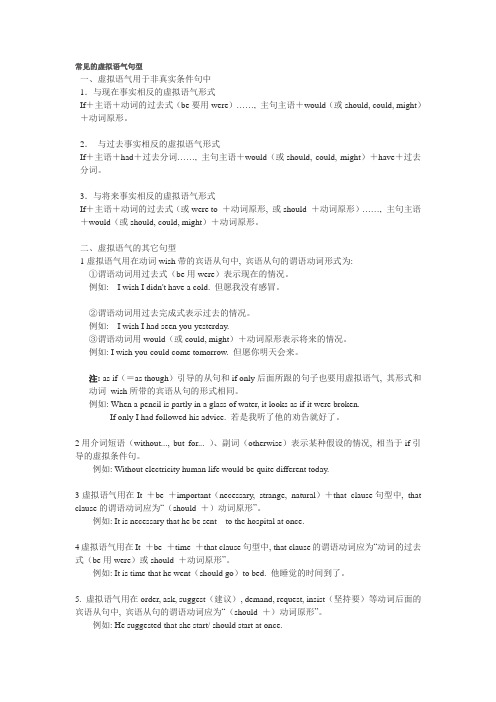
常见的虚拟语气句型一、虚拟语气用于非真实条件句中1.与现在事实相反的虚拟语气形式If+主语+动词的过去式(be要用were)……, 主句主语+would(或should, could, might)+动词原形。
2.与过去事实相反的虚拟语气形式If+主语+had+过去分词……, 主句主语+would(或should, could, might)+have+过去分词。
3.与将来事实相反的虚拟语气形式If+主语+动词的过去式(或were to +动词原形, 或should +动词原形)……, 主句主语+would(或should, could, might)+动词原形。
二、虚拟语气的其它句型1虚拟语气用在动词wish带的宾语从句中, 宾语从句的谓语动词形式为:①谓语动词用过去式(be用were)表示现在的情况。
例如: I wish I didn't have a cold. 但愿我没有感冒。
②谓语动词用过去完成式表示过去的情况。
例如: I wish I had seen you yesterday.③谓语动词用would(或could, might)+动词原形表示将来的情况。
例如: I wish you could come tomorrow. 但愿你明天会来。
注: as if(=as though)引导的从句和if only后面所跟的句子也要用虚拟语气, 其形式和动词wish所带的宾语从句的形式相同。
例如: When a pencil is partly in a glass of water, it looks as if it were broken.If only I had followed his advice. 若是我听了他的劝告就好了。
2用介词短语(without..., but for... )、副词(otherwise)表示某种假设的情况, 相当于if引导的虚拟条件句。
例如: Without electricity human life would be quite different today.3虚拟语气用在It +be +important(necessary, strange, natural)+that clause句型中, that clause的谓语动词应为“(should +)动词原形”。
虚拟语气十大句型
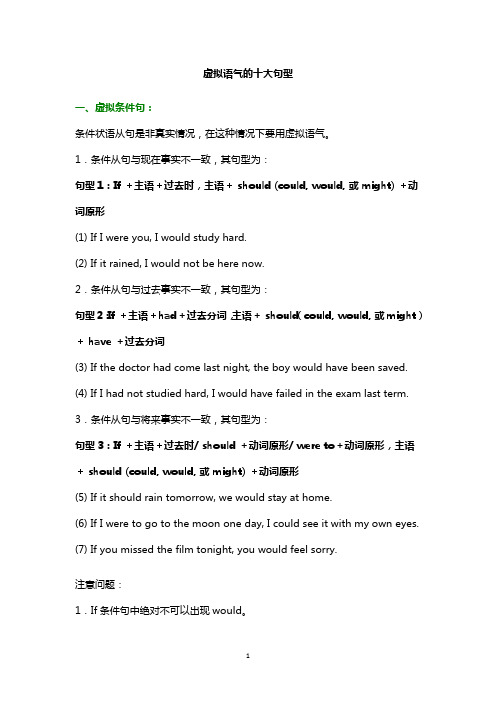
虚拟语气的十大句型一、虚拟条件句:条件状语从句是非真实情况,在这种情况下要用虚拟语气。
1.条件从句与现在事实不一致,其句型为:句型1:If +主语+过去时,主语+ should (could, would, 或might) +动词原形(1) If I were you, I would study hard.(2) If it rained, I would not be here now.2.条件从句与过去事实不一致,其句型为:句型2:If +主语+had+过去分词,主语+ should(could, would, 或might)+ have +过去分词(3) If the doctor had come last night, the boy would have been saved.(4) If I had not studied hard, I would have failed in the exam last term. 3.条件从句与将来事实不一致,其句型为:句型3:If +主语+过去时/ should +动词原形/ were to+动词原形,主语+ should (could, would, 或might) +动词原形(5) If it should rain tomorrow, we would stay at home.(6) If I were to go to the moon one day, I could see it with my own eyes.(7) If you missed the film tonight, you would feel sorry.注意问题:1.If条件句中绝对不可以出现would。
2.根据句中的时间状语,有时可能出现“混合虚拟”的情况,即主句可能是现在的情况,条件句也许是发生在过去的情况,但都要遵守上述句型。
如:(8) If you had studied hard before, you would be a college student now and you would graduate from a college in four years’ time.3.条件句中如果出现were, had, should可省去if,将主语与这些词倒装。
初中的解析虚拟语气的用法与句型

初中的解析虚拟语气的用法与句型解析虚拟语气是初中英语中的一个重要语法知识点,它表示一种与事实相反或不太可能实现的情况。
在语言表达中,虚拟语气经常用于表达建议、要求、命令、意愿、愿望、假设以及感叹等语境。
本文将通过解析虚拟语气的用法和常见句型,帮助初中学生更好地理解和运用虚拟语气。
一、虚拟语气的用法1. 虚拟语气用于表达与现在事实相反的情况。
例如:If I were you, I would study harder.如果我是你,我会更加努力学习。
2. 虚拟语气用于表示过去不可能实现的情况。
例如:He wishes he had bought that car.他希望自己当初买了那辆车。
3. 虚拟语气用于表达对现在或将来的建议、要求或愿望。
例如:I suggest that she go to bed early tonight.我建议她今晚早点睡觉。
4. 虚拟语气用于表示对过去行为的反悔、后悔或愿望改变。
例如:I wish I hadn't eaten so much dessert.我希望我没有吃那么多甜点。
5. 虚拟语气用于表示对某种假设或条件的情况下的想象。
例如:If I had a million dollars, I would travel around the world.如果我有一百万美元,我会环游世界。
二、虚拟语气的常见句型1. 条件句虚拟语气在条件句中,虚拟语气常常与过去时态连用。
例如:If I were rich, I would buy a big house.如果我有钱,我会买一栋大房子。
2. 祝愿句虚拟语气在表示祝愿的句子中,虚拟语气通常使用“wish”引导,后跟过去式或过去完成式。
例如:I wish I could go to the party with you.我希望我能和你一起去参加聚会。
3. 建议句虚拟语气在表示建议的句子中,虚拟语气通常使用“suggest”、“recommend”等动词引导,后跟从句的动词原形。
英语虚拟语气的用法和诀窍

虚拟语气15种句型
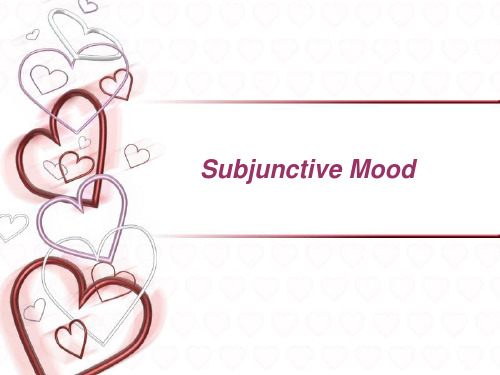
3.as if / as though后的表语或状语从句 (与wish相同)
含义 动 词 形 式
例句
现在 did / were
He looks as if he knew the little girl.
过去 Have done
It appeared as if nothing had
happened.
5.动词形式为(should)+do 的虚拟
2. It’s + adj.+that 的主语从句 (adj: necessary / essential/
important / natural / strange / possible / impossible
eg. It is important that we should attend the meeting.
• 对过去的猜测 • 肯定 must have done • 否定 can / could not have done • 可能 may / might have done
• 本应该做(实际没有做,有责备意思) • should have done • shouldn’t have done • 本来有必要作(实际没有做,不含责
desire 命令:order / command/ 坚持:insist 不管是动词还是名词,不管是主动还是被动
,不管是引导主语从句, 宾语从句, 表语 从句还是同位语从句, 都要用(should) do
5.动词形式为(should)+do 的虚拟
• My suggestion is that we should listen to his opinion first.
It is time that we stopped work and went home.
虚拟语气句型及其表现形式
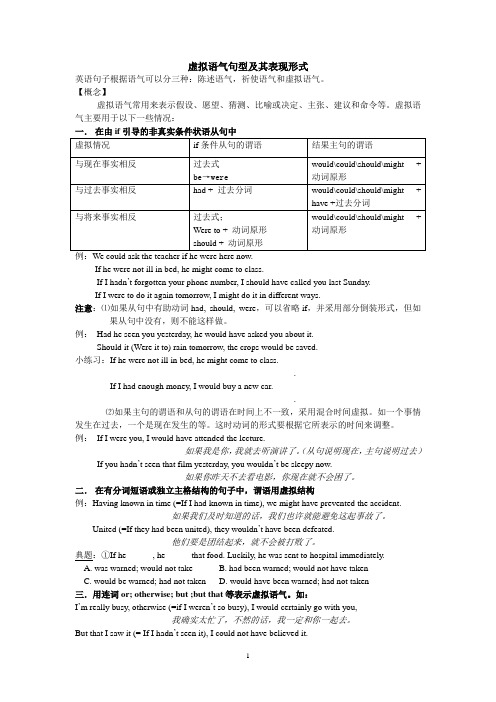
虚拟语气句型及其表现形式英语句子根据语气可以分三种:陈述语气,祈使语气和虚拟语气。
【概念】虚拟语气常用来表示假设、愿望、猜测、比喻或决定、主张、建议和命令等。
虚拟语气主要用于以下一些情况:一.在由if引导的非真实条件状语从句中If he were not ill in bed, he might come to class.If I hadn’t forgotten your phone number, I should have called you last Sunday.If I were to do it again tomorrow, I might do it in different ways.注意:⑪如果从句中有助动词had, should, were,可以省略if,并采用部分倒装形式,但如果从句中没有,则不能这样做。
例:Had he seen you yesterday, he would have asked you about it.Should it (Were it to) rain tomorrow, the crops would be saved.小练习:If he were not ill in bed, he might come to class.__________________________________________.If I had enough money, I would buy a new car.__________________________________________.⑫如果主句的谓语和从句的谓语在时间上不一致,采用混合时间虚拟。
如一个事情发生在过去,一个是现在发生的等。
这时动词的形式要根据它所表示的时间来调整。
例:If I were you, I would have attended the lecture.如果我是你,我就去听演讲了。
高中英语虚拟语气的十大句型

高中英语虚拟语气的十大句型虚拟条件句:条件状语从句是非真实情况,在这种情况下要用虚拟语气。
1.条件从句与现在事实不一致,其句型为:句型1:If +主语+过去时,主语+should (could, would, 或might) +动词原形(1) If I were you, I would study hard.(2) If it rained, I would not be here now.2.条件从句与过去事实不一致,其句型为:句型2:If +主语+had+过去分词,主语+should(could, would, 或might)+have +过去分词(3) If the doctor had come last night, the boy would have been saved.(4) If I had not studied hard, I would have failed in the exam last term.3.条件从句与将来事实不一致,其句型为:句型3:If +主语+过去时/ should +动词原形/ were to+动词原形,主语+should (could, would, 或might) +动词原形(5) If it should rain tomorrow, we would stay at home.(6) If I were to go to the moon one day, I could see it with my own eyes.(7) If you missed the film tonight, you would feel sorry.注意问题:1.If条件句中绝对不可以出现would。
2.根据句中的时间状语,有时可能出现“混合虚拟”的情况,即主句可能是现在的情况,条件句也许是发生在过去的情况,但都要遵守上述句型。
如:(8) If you had studied hard before, you would be a college student now and you would graduate from a college in four years’time. 3.条件句中如果出现were, had, should可省去if,将主语与这些词倒装。
虚拟语气,汉译英句型
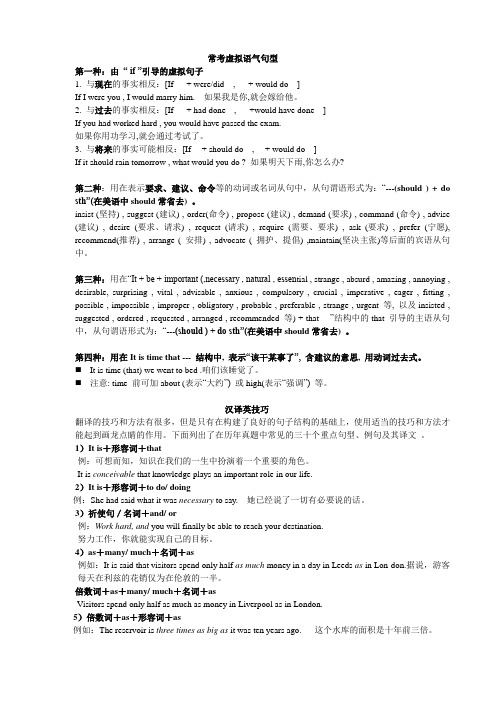
常考虚拟语气句型第一种:由“ if ”引导的虚拟句子1. 与现在的事实相反:[If --- + were/did---, --- + would do---]If I were you , I would marry him. 如果我是你,就会嫁给他。
2. 与过去的事实相反:[If --- + had done---, --- +would have done---]If you had worked hard , you would have passed the exam.如果你用功学习,就会通过考试了。
3. 与将来的事实可能相反:[If ---+ should do---, ---+ would do---]If it should rain tomorrow , what would you do ? 如果明天下雨,你怎么办?第二种:用在表示要求、建议、命令等的动词或名词从句中,从句谓语形式为:“---(should ) + do sth”(在美语中should常省去) 。
insist (坚持) , suggest (建议) , order(命令) , propose (建议) , demand (要求) , command (命令) , advise (建议) , desire (要求、请求) , request (请求) , require (需要、要求) , ask (要求) , prefer (宁愿), recommend(推荐) , arrange ( 安排) , advocate ( 拥护、提倡) ,maintain(坚决主张)等后面的宾语从句中。
第三种:用在“It + be + important (,necessary , natural , essen tial , strange , absurd , amazing , annoying , desirable, surprising , vital , advisable , anxious , compulsory , crucial , imperative , eager , fitting , possible , impossible , improper , obligatory , probable , preferable , strange , urgent 等, 以及insisted , suggested , ordered , requested , arranged , recommended 等) + that ---”结构中的that 引导的主语从句中,从句谓语形式为:“---(should ) + do sth”(在美语中should常省去) 。
虚拟语气特殊句型
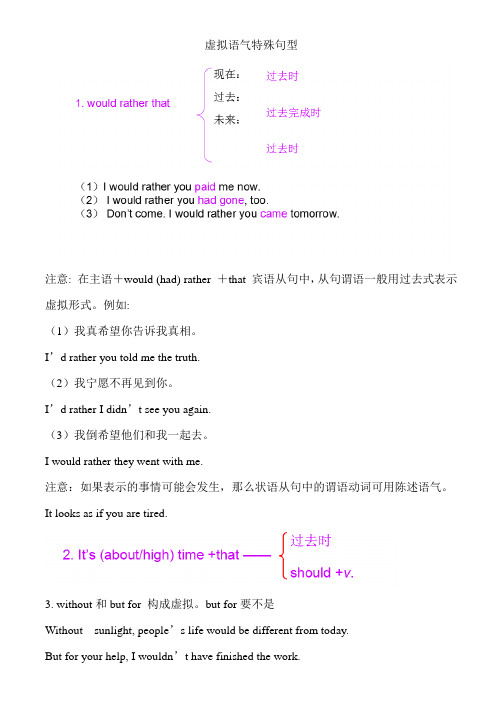
(2) = as long as常用陈述语气.
We can surely overcome these difficulties if only we are closely united.如果我们紧密团结就一定能战胜一切困难。
5.It’s necessary /strange/ natural/ important + that-Clause从句中的动词要用虚拟,即(should)+动词原形
(暗含条件是butfor your help)
(4)This same thing, happening in wartime, would lead to a disaster.
(条件暗含在分词短语happening in wartime中)
(5)He must have the strength of a hippopotamus, or he never could have vanquished that great beast.
(2)我宁愿不再见到你。
I’d rather I didn’t see you again.
(3)我倒希望他们和我一起去。
I would rather they went with me.
注意:如果表示的事情可能会发生,那么状语从句中的谓语动词可用陈述语气。
It looks as if you are tired.
含蓄条件句非真实条件句中的条件从句有时不表现出来只暗含在上下文中这种句子叫做含蓄条件句
虚拟语气特殊句型
注意:在主语+would (had) rather+that宾语从句中,从句谓语一般用过去式表示虚拟形式。例如:
(1)我真希望你告诉我真相。
虚拟语气15种句型总结
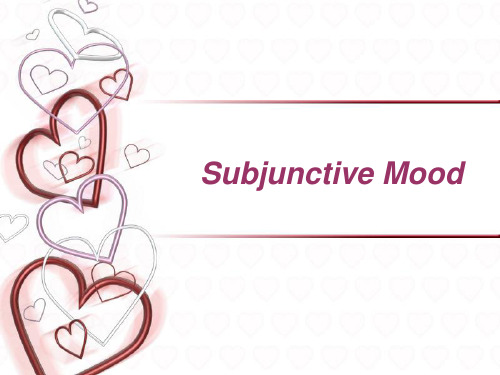
C.didn’t hurt; would go
D.didn’t hurt; would have gone
17 21 19
2.wish 后的宾语从句 = if only
含义
动词形式
对现状 表达愿望 Did / were
对过去表示 遗憾/后悔
Had done
例句
I wish I had a little lab of my own.
备意思)
• Need have done • Needn't have done
Practice
1. If I _k_n_e_w__ (know) her address, I would write to her. 2. What would you have done if you _h_a_d__m__is_s_e_d(miss) the train? 3. If he h__a_d_n_o_t_b__ee_n_ il(lnot be ill ), he would have done something. snows 4. If itw__er_e__to__/s_h_o_u_l_d__sn_o_w__/_s_n_o_w_e_d(snow) tomorrow, we _sh__o_u_ld__g_e_t_u_p_(get up) early.
• My suggestion that we should listen to his opinion first is being discussed.
• 注意当insist—硬说,suggest—表明, 不能有虚拟语气。
5.动词形式为(should)+do 的虚拟
2. It’s + adj.+that 的主语从句 (adj: necessary / essential/
虚拟语气讲义(15个句式)

虚拟语气讲义1.虚拟语气句型1If + were/ did/ (动词的过去式), 主语+would/ might/ should / could + do 。
(表示对现在的假设)eg. If I were you, I would not be so proud . 如果我是你,我不会如此自负.eg. I don’t have a cellphone. If I had one , it would be convenient for me to get in touch with others 我没有手机,如果我有手机的话,和别人联系就方便的多了。
eg. If I were in your position, I would think better of it .如果我处在你现在的境地,我会重新考虑然后放弃。
2. 虚拟语气句型2If + had done, 主语+would/ might/ should / could + have done表示对过去或已经发生事情的虚拟假设。
eg. What a pity it is that you didn’t attended the concert yesterday! If you had attended the concert, you would have seen the famous singer.真遗憾你昨天没有去听音乐会。
如果你去了,你就会见到那位名歌手。
eg. Anyone in his position would have done the same= If anyone had been in his position, he would have done the same.3. 虚拟语气句型3If + were/ did(动词过去式)/should/ were to do , 主语+would/ might/ should / could + do (表示对将来的假设).eg. If he should refuse (= if he were to refuse = if he refused ), it wouldn’t matter万一他拒绝了. 那也没有什么关系.eg. If you shouldn’t pass the college entrance e*amination, what would you do"万一你高考不中,你该怎么办?4. 虚拟语气条件句的倒装在虚拟条件句中,如果出现有were, had, should,可省去if,可将主语与这些词倒装,构成虚拟倒装句。
虚拟句型结构及用法
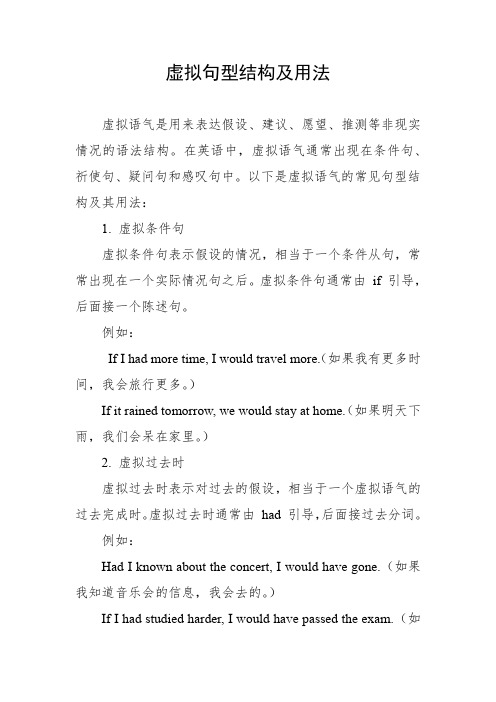
虚拟句型结构及用法虚拟语气是用来表达假设、建议、愿望、推测等非现实情况的语法结构。
在英语中,虚拟语气通常出现在条件句、祈使句、疑问句和感叹句中。
以下是虚拟语气的常见句型结构及其用法:1. 虚拟条件句虚拟条件句表示假设的情况,相当于一个条件从句,常常出现在一个实际情况句之后。
虚拟条件句通常由if 引导,后面接一个陈述句。
例如:If I had more time, I would travel more.(如果我有更多时间,我会旅行更多。
)If it rained tomorrow, we would stay at home.(如果明天下雨,我们会呆在家里。
)2. 虚拟过去时虚拟过去时表示对过去的假设,相当于一个虚拟语气的过去完成时。
虚拟过去时通常由had 引导,后面接过去分词。
例如:Had I known about the concert, I would have gone.(如果我知道音乐会的信息,我会去的。
)If I had studied harder, I would have passed the exam.(如果我学习得更努力,我会通过考试的。
)3. 虚拟将来时虚拟将来时表示对将来的假设,相当于一个虚拟语气的将来时。
虚拟将来时通常由should 或were to 引导,后面接动词原形。
例如:Should I go to the party?(我应该去参加聚会吗?)If she were to call me, what would I say?(如果她给我打电话,我会说些什么?)4. 虚拟祈使句虚拟祈使句表示对过去或将来的建议、命令或请求。
虚拟祈使句通常由should 或were to 引导,后面接动词原形。
例如:Should I go to the doctor?(我应该去看医生吗?)If I were to ask him, what would he say?(如果我问他,他会怎么说?)5. 虚拟感叹句虚拟感叹句表示对假设的情况的感叹。
虚拟语气
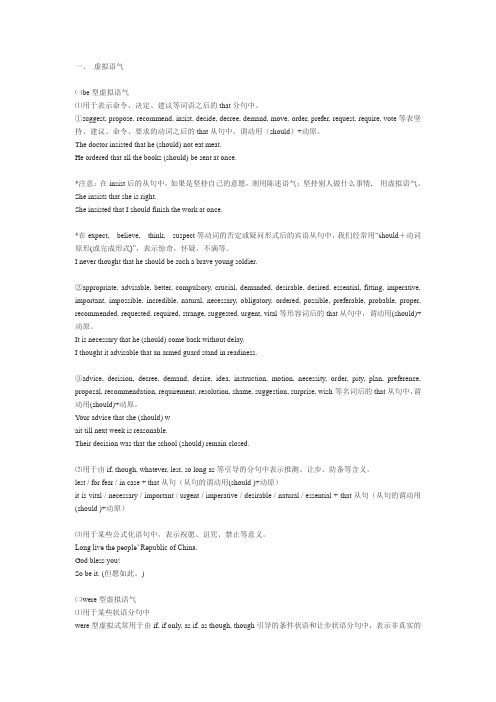
一、虚拟语气㈠be型虚拟语气⑪用于表示命令、决定、建议等词语之后的that分句中。
①suggest, propose, recommend, insist, decide, decree, demand, move, order, prefer, request, require, vote等表坚持、建议、命令、要求的动词之后的that从句中,谓动用(should)+动原。
The doctor insisted that he (should) not eat meat.He ordered that all the books (should) be sent at once.*注意:在insist后的从句中,如果是坚持自己的意愿,则用陈述语气;坚持别人做什么事情,用虚拟语气。
She insists that she is right.She insisted that I should finish the work at once.*在expect,believe,think,suspect等动词的否定或疑问形式后的宾语从句中,我们经常用“should+动词原形(或完成形式)”,表示惊奇,怀疑,不满等。
I never thought that he should be such a brave young soldier.②appropriate, advisable, better, compulsory, crucial, demanded, desirable, desired, essential, fitting, imperative, important, impossible, incredible, natural, necessary, obligatory, ordered, possible, preferable, probable, proper, recommended, requested, required, strange, suggested, urgent, vital等形容词后的that从句中,谓动用(should)+动原。
虚拟语气

虚拟语气句型 1 (与现在事实相反)在条件句中用虚拟语气是表示对现在情况的假设,是一种非真实条件句。
句型:If +主语did (were)…,主语would do …主句中除了would之外,还可用情态动词could, might, should.If I were you, I would (could, might, should) help him.虚拟语气句型 2 (与过去事实相反)句型2是对过去情况的假设,表示与过去事实相反的条件和结果。
句型:If 主语 had done,主语 +would have done虚拟语气句型 3 (与将来事实相反)句型3是对将来情况的假设,表示与将来事实相反或可能相反的条件和结果。
句型:If +主语were to / should + 动词原形…,主语woulddo…虚拟语气句型 4 (错综时间虚拟条件句)有时条件从句和主句所表示的动作在时间上可以不一致(例如一个与过去事实相反,另一个与现在事实相反),这种虚拟条件句就称为错综时间虚拟条件句。
在这种条件句中,动词的形式要根据具体情况进行调整。
例句:She would never have behaved like that if she had some common sense.如果她有一些常识的话,她就决不会像那样做了。
If he had listened to me, he would not be in such trouble now.如果他听了我的话,他现在就不会有这样的麻烦。
If I had a bike (now), I would have lent it to you yesterday.假如我有自行车,昨天早就借给你了。
If you had not studied the problem carefully, you would find difficulty now.如果当初你没有认真研究这个问题,现在你就会遇到困难。
- 1、下载文档前请自行甄别文档内容的完整性,平台不提供额外的编辑、内容补充、找答案等附加服务。
- 2、"仅部分预览"的文档,不可在线预览部分如存在完整性等问题,可反馈申请退款(可完整预览的文档不适用该条件!)。
- 3、如文档侵犯您的权益,请联系客服反馈,我们会尽快为您处理(人工客服工作时间:9:00-18:30)。
常用虚拟语气句型
1.if条件句
条件状语从句可分为真实条件句,即条件满足,事实就发生的情况;和非真实条件句,即与事实相反或难以实现的假设情况。
虚拟语气的基本句型,即是这种非真实条件状语从句。
If I had got up early, I wouldn’t have been late.
If I were to do it, I should do it at once.
【说明】
①在非正式英语中,条件从句中的第一、第三人称单数主语后可用was代替were。
If I was you, I would accept the invitation.
②主句中的would可用于各种人称,而should只用于第一人称。
③在主句中也可用情态动词could,might代替would,should。
If I had had enough time, I might have done it better.
④条件从句中的谓语动词含有were,had,should时,可以省略从属连接词if,然后采
用倒装结构,把were,had,should移到主语前面。
Should you pass this way, do drop in for a visit.= If you should pass this way,…… Had I known it, I wouldn’t had made such a silly mistake.= If I had known it,…… Were it left to me to decide whether I should have a job immediately or go on to study at college, I wouldn’t hesitate a moment to choose the latter.= If it were left to me to decide……..
⑤在同一个句子中不能一部分表示真实条件,另一部分表示非真实条件。
[误]If my grandfather comes tomorrow, I should stay home.
[正]If my grandfather comes tomorrow, I shall stay home.
[正]If my grandfather were to come tomorrow, I should stay home.
⑥有时,条件和结果发生的时间不一致,动词形式便要作适当调整,变成错综时间条件句。
If you had taken the medicine, you would be well now.
If he were honest, he would had told us the truth.
If it hadn’t rained so much, we would have a good harvest in autumn.
2.介词或介词短语without/ thanks to/ but for +名词结构代替if条件句表示的虚拟语
Thanks to the man’s timely rescue, the child would have been drowned.
Without the sun and water, nothing would live.
I wish I had not failed the chemistry examination.
I wish I would become a pilot when I grow up.
*hope与wish不同,后面接宾语从句一般表示真实情况,其愿望一般可以实现。
I hope it will be fine tomorrow.
但如果说had hoped,则表示一种过去未实现的愿望,宾语从句用would +动词原形来表示。
I had hoped Tom would attend the meeting.
He talks as if he had been on the spot.
The situation seems as if it would be out of control.
If only I had not been that silly!
If only the rain would stop!
*此句型大多可与wish句型转换。
如上面三句分别相当于:
I wish I were with you now.
I wish I had not been that silly.
I wish the rain would stop.
7.suggest, require, order, etc. +宾语从句
在一些表示建议、愿望、要求、请求、劝告、意志、欲望、命令、安排、决定等的动词的宾语从句中,要用虚拟语气。
其形式是should +动词原形。
肯定句式中should可以省略,而仅用动词原形。
这类动词有:ask,require,request,demand,pray,insist,desire,maintain,propose,suggest,move,urge,advise,recommend,command,order,arrange,decide等。
She demanded (that) the paper (should) be rewritten.
I suggest (that) he (should) get there as soon
8.it is important, required, etc. +主语从句
在it is +表示要求、建议、必要、命令等意思的形容词或分词+主语从句的结构中,要用should +动词原形的虚拟语气,should可省略。
这类形容词和分词有:advised,advisable,better,desired,desirable,demanded,essential,important,natural,necessary,ordered,proposed,possible,probable,preferable,recommended,required,suggested,strange,urgent,strange,incredible等;这个表语结构也可以是it is a pity,it is a wonder,it is a shame等。
It’s necessary (that) we (should) start to do the work right away.
It’s urgent we (should) send for a doctor at once.
It is a pity that she (should) call black white.
9.用于表语从句或同位语从句中的虚拟语气
在一些表示愿望、建议、要求、命令等意义的名词后的表语从句或同位语从句后,谓语动词要用虚拟语气。
这类名词有:advice,decision,idea,order,plan,proposal,recommendation,suggestion,opinion,requirement,direction,policy等。
My opinion is that we (should) review their proposal right now.
He made the request that the problem (should) be settled at once.
10.Lest/ for fear (that)/ in case 引导的状语从句
这类状语从句表示担心、忧虑,谓语动词用(should) +动词原形构成。
I’m telling you this lest you (should) doubt my sincerity.
Julia had to go on a diet for fear that she (should) lose her job as a model.
11.in order that, so that +目的状语从句
We started our journey before dawn so that we might stand a chance to reach there before sunset.
12.其他虚拟语气句式
①would rather/would as soon/would sooner +从句
I would rather you were in the same group as we are.
I’d just as soon you didn’t repeat such a careless mistake.
②通过上下文表示假设的情况。
2
Ted just gives up everything for her. I would not be that silly.
Ted为了她舍弃了一切,我就不会这么傻。
③had + expected/ hoped/ supposed, etc.表示希望、设想、预期而未实现的过去动作。
I had expected I would pass the driving test.
④表示祝愿的话中。
May our longstanding friendship last for ever!
Love live the peace of the world!。
